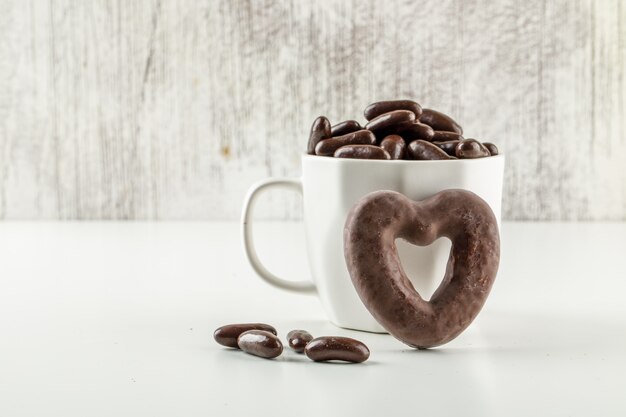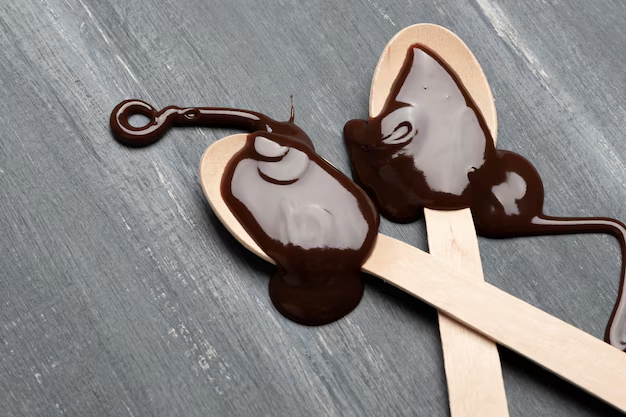Chocolate is one of the most beloved treats worldwide. From creamy milk chocolate bars to rich dark truffles, its versatility makes it a favorite for people of all ages. However, one common question often arises: Does chocolate have caffeine?
Understanding the caffeine content in chocolate is important, especially for individuals who are sensitive to caffeine or monitoring their intake. Caffeine, a natural stimulant, is found in cocoa beans, the primary ingredient in chocolate. Depending on the type of chocolate, the caffeine levels can vary. Let’s explore this fascinating topic in more detail.
Does Chocolate Have Caffeine?
Yes, chocolate does contain caffeine. Caffeine occurs naturally in cocoa beans, which are the source of chocolate. This stimulant is responsible for the mild energy boost some people feel after eating chocolate.
How Caffeine Varies by Chocolate Type
The caffeine content in chocolate depends on the amount of cocoa solids it contains:
- Dark chocolate: Contains the most caffeine due to its high cocoa percentage.
- Milk chocolate: Has less caffeine because it includes more sugar and milk, diluting the cocoa.
- White chocolate: Contains little to no caffeine because it is made from cocoa butter, not cocoa solids.
Chocolate Ingredients
Chocolate is made from several key components that determine its flavor, texture, and caffeine content.
Key Components in Chocolate
- Cocoa Solids: These are the source of caffeine and provide the rich chocolate flavor.
- Cocoa Butter: This is the fat extracted from cocoa beans and is caffeine-free.
- Sugar: Added to sweeten chocolate, especially in milk and white varieties.
- Milk: Used in milk chocolate to create a creamy texture.
How Caffeine Is Derived from Cocoa Solids?
Caffeine is naturally found in the cocoa solids of the cocoa bean. Darker chocolates, which have a higher cocoa content, also have more cocoa solids. This is why dark chocolate contains more caffeine than milk or white chocolate.
Chocolate Nutrients
Chocolate is not just about caffeine. It is packed with nutrients that offer several health benefits, though it also has its downsides.

Nutritional Benefits of Chocolate
- Antioxidants: Cocoa is rich in flavonoids, which help reduce inflammation and improve heart health.
- Magnesium: Dark chocolate is an excellent source of magnesium, essential for muscle and nerve function.
- Mood Booster: Compounds like theobromine and phenylethylamine in chocolate can enhance mood.
Potential Drawbacks
- Sugar: Many chocolates, especially milk chocolate, are high in added sugars, contributing to weight gain and dental issues.
- Calories: Chocolate is calorie-dense, making portion control important.
- Caffeine: While beneficial in small amounts, caffeine in excess can lead to jitters or sleep disturbances.
Is There Caffeine in Milk Chocolate?
Yes, milk chocolate does contain caffeine, but its levels are much lower than those in dark chocolate. The combination of added milk and sugar dilutes the cocoa solids, reducing the caffeine content.
How Much Caffeine Is in Milk Chocolate?
A standard 1.55-ounce (43-gram) milk chocolate bar contains approximately 9 milligrams of caffeine. For comparison, an 8-ounce cup of coffee typically has around 95 milligrams.
Does Dairy Milk Chocolate Contain Caffeine?
Yes, Cadbury Dairy Milk Chocolate contains caffeine, though the amount is minimal. A typical serving has about 5-10 milligrams, depending on the size of the bar and the cocoa percentage.
Does Dark Chocolate Have Caffeine?
Dark chocolate contains significantly more caffeine than milk chocolate. This is because it has a higher concentration of cocoa solids, where caffeine is found.
Caffeine Levels in Dark Chocolate Based on Cocoa Percentage
The higher the cocoa percentage, the more caffeine the chocolate contains. For example:
- 70% Dark Chocolate: Contains about 20 milligrams of caffeine per ounce.
- 85% Dark Chocolate: May contain up to 25 milligrams of caffeine per ounce.
Why Dark Chocolate Typically Contains More Caffeine
Dark chocolate often contains little to no added milk or sugar, leaving a high concentration of cocoa solids. This amplifies both its flavor and caffeine levels, making it a preferred choice for those who enjoy a strong chocolate taste with a slight energy boost.
Does White Chocolate Have Caffeine?
White chocolate is unique because it is made without cocoa solids, which are the primary source of caffeine in chocolate. Instead, white chocolate is composed of cocoa butter, sugar, and milk, giving it its creamy and sweet flavor.
Why White Chocolate Lacks Caffeine
Caffeine is naturally found in cocoa solids, not in cocoa butter. Since white chocolate is made entirely from cocoa butter and contains no cocoa solids, it has virtually no caffeine. This makes it a great option for those who enjoy chocolate flavors but want to avoid caffeine entirely.
Is There Caffeine in Hot Chocolate?
Yes, hot chocolate contains caffeine, but the levels are generally lower than those in chocolate bars. The caffeine in hot chocolate comes from the cocoa powder or chocolate used in its preparation.
How Hot Chocolate Differs in Caffeine Content from Chocolate Bars
- A typical cup of hot chocolate contains 2-7 milligrams of caffeine, depending on the recipe.
- In comparison, a 1-ounce piece of dark chocolate can have 20-25 milligrams of caffeine.
Factors That Influence Caffeine Levels in Hot Chocolate
- Type of Cocoa Used: Hot chocolate made with dark chocolate or pure cocoa powder has higher caffeine levels.
- Serving Size: Larger servings naturally contain more caffeine.
- Added Ingredients: Using milk chocolate or sugar blends can lower the caffeine content compared to darker chocolate bases.
To Read: Chocolate Chip Mini Muffins Recipe
Does Chocolate Syrup Have Caffeine?

Chocolate syrups, like those used in milkshakes or desserts, do contain small amounts of caffeine. The caffeine comes from the cocoa used in their formulation.
Caffeine in Popular Chocolate Syrups
- Hershey’s Chocolate Syrup: Contains about 2 milligrams of caffeine per tablespoon.
- Other Brands: Syrups made with higher cocoa content or dark chocolate bases may contain slightly more caffeine.
Comparison with Other Chocolate-Based Products
Chocolate syrup has less caffeine compared to solid chocolate bars because it is diluted with water, sugar, and other ingredients. For example:
- One tablespoon of chocolate syrup has significantly less caffeine than a small piece of dark chocolate or a cup of hot chocolate.
Caffeine in Chocolate vs. Coffee: What to Know
When comparing caffeine levels, coffee far surpasses chocolate. Coffee is a concentrated source of caffeine, while chocolate has milder levels due to its cocoa content.
What Has More Caffeine: Coffee or Chocolate?
- Coffee: An 8-ounce cup contains about 95 milligrams of caffeine, significantly more than chocolate.
- Chocolate: A standard piece of dark chocolate has around 20 milligrams, while milk chocolate has only about 9 milligrams per serving.
Comparing the Caffeine Kick from Chocolate to Coffee
- Coffee: Provides a rapid and noticeable energy boost due to its high caffeine content.
- Chocolate: Offers a gentler stimulant effect, ideal for those seeking a smaller caffeine dose.
While chocolate is not a replacement for coffee in terms of caffeine, it can be a satisfying alternative for a lighter boost.
FAQs
Is any chocolate caffeine-free?
Yes, white chocolate is caffeine-free because it contains no cocoa solids, which are the source of caffeine in chocolate products.
Does Cadbury chocolate have caffeine?
Yes, Cadbury chocolate contains caffeine, with levels depending on the type. Dairy Milk has minimal caffeine, while dark variants have slightly more.
Can you eat chocolate if you can’t have caffeine?
Yes, you can opt for white chocolate, which is caffeine-free, or check labels for low-caffeine milk chocolate options.
Conclusion
So, does chocolate have caffeine? The answer is yes, but the amount depends on the type of chocolate. Dark chocolate has the highest levels, milk chocolate contains moderate amounts, and white chocolate is virtually caffeine-free. Products like hot chocolate and chocolate syrup also have small amounts of caffeine, influenced by the cocoa content and preparation methods.
Understanding the caffeine levels in chocolate helps you make informed choices, whether you’re managing your caffeine intake or simply looking for the perfect treat. Moderation is key to enjoying chocolate while balancing its nutritional benefits and potential drawbacks.

